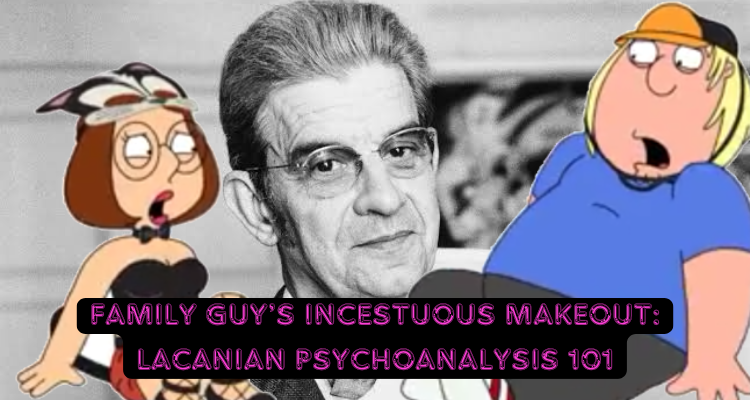Chris and Meg’s infamous “seven minutes in heaven” scene in Family Guy begins as a thrilling, teenage hormone-fueled makeout session in a dark closet. Once they realize they’re siblings, however, it becomes revolting. The action doesn’t change, only its meaning does. But how?
We like to think attraction and disgust are natural responses, hardwired into us by biology or shaped by morality. But what if they aren’t? What if desire itself isn’t truly ours, and it’s dictated by forces we don’t even control?
Psychoanalyst Jacques Lacan argued that what we want isn’t something we choose—it’s something imposed on us. We don’t only experience desire; we experience it through a system that tells us what’s desirable and what’s off-limits.
And nothing illustrates that better than this Family Guy scene, where a single word—sibling—instantly rewrites attraction into disgust.
Saussure & Signs
As a French academic rising to prominence in the 1950’s, Lacan’s work was heavily influenced by Structuralists like Ferdinand de Saussure. Let’s start with a “cheeky” example from Modern Family to explain one of the linguist’s key ideas.
Phil Dunphy, the sitcom’s self-proclaimed “cool dad”, accidentally grabs his daughter’s roommate’s butt (0:55), mistaking it for his wife Claire’s. He even quips, “I’d like admission to your student body,” before realizing his mistake, leaving him mortified. This moment clearly demonstrates de Saussure’s concept of the sign. In Course in General Linguistics (1916), he writes:
“The linguistic sign unites, not a thing and a name, but a concept [signified] and a sound-image [signifier]. The latter is not the material sound, a purely physical thing, but the psychological imprint of the sound, the impression that it makes on our senses… The bond between the signifier and the signified is arbitrary… in that it actually has no natural connection with the signified.” (p. 66-69)
In other words, the signifier is just the ‘thing’—it’s meaningless on its own. In this example, the signifier is the butt. Phil explains that the two signifiers (butts) are identical, saying to Claire, “Honey, turn around and show him your butt–it’s uncanny.”
Meanwhile, the signified is what we interpret that thing to mean, based on context. Once Phil realizes the butt belongs to someone else—his daughter’s roommate—the signified shifts entirely.
Freud & Repression
Freud takes contextual meaning a step further: some meanings aren’t just reinterpreted; they must be repressed. He argued that human desire is shaped by unconscious repression, with the incest taboo forming the foundation of civilization itself.
In Totem and Taboo (1913), he argues that incest avoidance isn’t entirely biological, but also cultural, writing, “The interpretation of incest dread as an innate instinct must… be abandoned.” (p. 205)
Instead, it’s been enforced by generations of repression. For Freud, this prohibition is deeply ingrained in the psyche, internalized through the superego, which dictates what must remain unthinkable.
In the dark, Chris and Meg share a passionate kiss, unburdened by the incest taboo. But the moment the lights turn on, revealing their sibling relationship, their desire is instantly rewritten as repulsion.
This is what Freud would call the return of the repressed—the superego slams down the taboo, forcing an immediate reaction of disgust, horror, and shame. What was thrilling seconds ago is now unbearable. Not because anything changed—but because repression finally caught up.
Lacan & Freud
Where Freud sees repression as a defensive mechanism pushing desires into the unconscious, Lacan argues that the unconscious itself is structured by language—meaning desire isn’t merely hidden, but actively shaped by the system of signifiers.
For him, prohibition doesn’t follow from guilt; it structures desire itself. We don’t desire things and then get told “no”—we desire precisely because we’re told no.
Chris and Meg don’t go into the closet intending to kiss. They’re desperate, lonely teenagers, starved for sexual and romantic attention. The Symbolic Order—the realm of language and social meaning—has already imposed a different ‘No’ on them: they’re outside the field of sexual attention. This absence of desirability becomes the very thing that fuels their extreme longing to experience it, however they can.
Their participation in Seven Minutes in Heaven isn’t just a game—it’s an attempt to circumvent the everyday “No” imposed by the Symbolic Order.
Lacan & Saussure
Lacan also builds on Saussure’s concept of the sign, arguing that the unconscious operates through signifiers, just like language. He writes:
“The register of the signifier is instituted on the basis of the fact that a signifier represents a subject to another signifier.” (Écrits, p. 713)
In other words, our identity and desires aren’t fixed—they’re shaped by signifiers, shifting as new meanings emerge.
This is exactly what happens in Family Guy. In the dark, Chris and Meg’s kiss exists as a signifier linked to passion and mystery. But the moment the word ‘sibling’ is introduced, the signified shifts entirely. Their desire doesn’t change—its meaning does.
Why does this shift feel so absolute? Because language doesn’t just describe reality—it structures it.
Lacan and the Symbolic Order
For Lacan, entering the Symbolic Order splits us from our raw, pre-linguistic existence. Once we’re named, categorized, and placed within a system of signifiers, we are bound by its rules. He writes:
“Produced in the locus of the yet-to-be-situated Other, the signifier brings forth a subject from a being that cannot yet speak, but at the cost of freezing him.” (Écrits, p. 713)
Before the label “sibling” is introduced, Chris and Meg exist in a fluid space where desire is possible. But once they’re named as brother and sister, their desires are no longer their own—they’re frozen within the incest taboo.
We see the same dynamic in Trainspotting, when Begbie, the hyper-masculine thug, unknowingly starts to hook up with a trans woman. Initially, the signifiers he focuses on—skin, lips, body—produce a clear signified: ‘attractive woman.’
But the moment an unexpected signifier appears—a penis—his symbolic framework violently shifts. In an instant, what was desirable becomes intolerable. Not because the physical reality changed, but because his Symbolic Order imposed a new meaning on the encounter. And, like Chris and Meg, Begbie isn’t just disgusted—he’s furious. Because his unconscious desire has just been rewritten in real-time, and the Symbolic Order won’t let him ignore it.
In both examples, the makeout, once signifying romance, is transformed into horror, showing that the unconscious was never outside of language; it was always mediated by signifiers.
Do We Control What We Desire?
Lacan’s point is clear: meaning isn’t stable—it shifts based on language and context. The Symbolic Order dictates how we process even our most personal desires, structuring the unconscious itself like a language. Chris and Meg’s horror isn’t just about repression; it’s about the realization that their attraction was real until language told them it couldn’t be.
But if language structures desire, where does that leave us? Are we trapped within the signifiers imposed on us, or does recognizing this structure offer us a way to break free?
Philosopher Slavoj Žižek argues that even when we recognize how language and ideology shape our desires, we don’t escape them—we just find new ways to obey. We might believe we’ve broken free from these structures, but in trying to resist them, we often end up reinforcing their hold in new ways. The very act of naming our desires keeps us within the system that produces them.
Yet, contemporary clinical Lacanian psychoanalysts, such as Bruce Fink, suggest that while we can’t erase these structures, we can change how we relate to them. In therapy, people sometimes realize that what they thought they wanted was shaped by unconscious patterns—like always falling for unavailable partners, sabotaging opportunities, or chasing success that never feels fulfilling.
A woman who repeatedly falls for distant, emotionally unavailable partners might come to see that what she perceives as “love” is actually a reenactment of seeking approval from a distant parent. A man obsessed with professional achievement might realize that his drive isn’t about personal ambition, but about proving his worth to someone long absent from his life. By recognizing these patterns and the hidden logic behind them, their grip can loosen. Therapy doesn’t erase desire, but it can disrupt old fixations—allowing people to want differently, perhaps for the first time.



